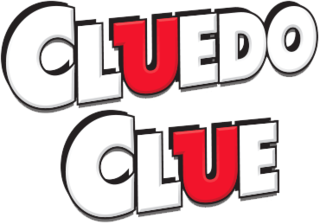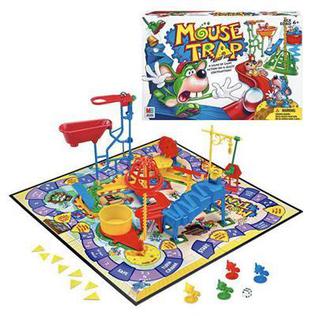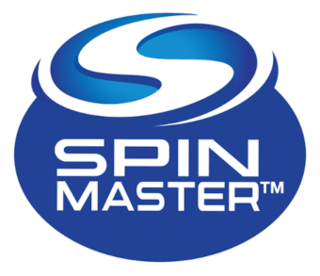
Cluedo, known as Clue in North America, is a murder mystery game for three to six players that was devised in 1943 by British board game designer Anthony E. Pratt. The game was first manufactured by Waddingtons in the United Kingdom in 1949. Since then, it has been relaunched and updated several times, and it is currently owned and published by the American game and toy company Hasbro.

Trivial Pursuit is a board game in which winning is determined by a player's ability to answer trivia and popular culture questions. Players move their pieces around a board, the squares they land on determining the subject of a question they are asked from a card. Each correct answer allows the player's turn to continue; a correct answer on one of the six "category headquarters" spaces earns a plastic wedge which is slotted into the answerer's playing piece. The object of the game is to collect all six wedges from each "category headquarters" space, and then return to the center "hub" space to answer a question in a category selected by the other players.

Jenga is a game of physical skill created by British board game designer and author Leslie Scott and marketed by Hasbro. Players take turns removing one block at a time from a tower constructed of 54 blocks. Each block removed is then placed on top of the tower, creating a progressively more unstable structure.

Tapper, also known as Root Beer Tapper, is a 1983 arcade game developed by Marvin Glass and Associates and released by Bally Midway. Tapper puts the player in the shoes of a bartender who must serve eager, thirsty patrons while collecting empty mugs and tips. It was distributed in Japan by Sega in 1984.

Tokimeki Memorial is a dating simulation series by Konami. It consists of six main games in addition to many spin-offs. The games are notable in the dating sim genre for being highly nonlinear. Their nickname amongst their fans is the contraction TokiMemo.

Operation is a battery-operated game of physical skill that tests players' hand-eye coordination and fine motor skills. The game's prototype was invented in 1964 by University of Illinois industrial-design student John Spinello, who sold his rights to renowned toy designer Marvin Glass for $500 and the promise of a job upon graduation, which was not fulfilled. Initially produced by Milton Bradley in 1965, Operation is currently produced by Hasbro, with an estimated franchise worth $40 million.

Mouse Trap is a board game first published by Ideal in 1963 for two to four players. It is one of the first mass-produced three-dimensional board games. Players at first cooperate to build a working mouse trap in the style of a Rube Goldberg machine. Then, players turn against each other to trap opponents' mouse-shaped game pieces.

Rock 'Em Sock 'Em Robots is a two-player action toy and game designed by Marvin Glass and Associates and was first manufactured by the Marx toy company in 1964. It features two dueling robot boxers, Red Rocker and Blue Bomber, mechanically manipulated by the players, and the game is won when one player knocks the head off of the opponent. The 2000s version of the game by Mattel features physically smaller robots.
Marvin Glass and Associates (MGA) was a toy design and engineering firm based in Chicago. Marvin Glass (1914–1974) and his employees created some of the most successful toys and games of the twentieth century such as Mr. Machine, Rock 'Em Sock 'Em Robots, Lite Brite, Ants in the Pants, Mouse Trap, Operation, Simon, Body Language, and the Evel Knievel Stunt Cycle.

Ideal Toy Company was an American toy company founded by Morris Michtom and his wife, Rose. During the post–World War II baby boom era, Ideal became the largest doll-making company in the United States. Their most popular dolls included Betsy Wetsy, Toni, Saucy Walker, Shirley Temple, Miss Revlon, Patti Playpal, Tammy, Thumbelina, Tiny Thumbelina, and Crissy. The company is also known for selling the Rubik's Cube.

Selchow and Righter was a 19th- and 20th-century game manufacturer best known for the games Parcheesi and Scrabble. It was based in Bay Shore, New York.

The Secret of Shadow Ranch is the tenth installment in the Nancy Drew point-and-click adventure game series by Her Interactive. The game is available for play on Microsoft Windows platforms. It has an ESRB rating of E for moments of mild violence and peril. Players take on the first-person view of fictional amateur sleuth Nancy Drew and must solve the mystery through interrogation of suspects, solving puzzles, and discovering clues. There are two levels of gameplay, Junior and Senior detective modes, each offering a different difficulty level of puzzles and hints, however neither of these changes affect the actual plot of the game. The game is based on the best-selling Nancy Drew book of all time, The Secret at Shadow Ranch (1931).

Toss Across is a game first introduced in 1969 by the now defunct Ideal Toy Company. The game was designed by Marvin Glass and Associates and created by Hank Kramer, Larry Reiner and Walter Moe, and is now distributed by Mattel. It is a game in which participants play tic-tac-toe by lobbing small beanbags at targets in an attempt to change the targets to their desired letter. As in traditional tic-tac-toe, the first player to get three of their letters in a row wins the game. There are other similar games to Toss Across known under different names, such as Tic Tac Throw.

René Joseph Hall was an American guitarist and arranger. He was among the most important behind the scenes figures in early rock and roll, but his career spanned the period from the late 1920s to the late 1980s, and encompassed multiple musical styles.
Dating is a term coined in America to signify the stage of romantic relationships in which two individuals engage in an activity together, most often with the intention of evaluating each other's suitability as a partner in a future intimate relationship. It falls into the category of courtship, consisting of social events carried out by the couple either alone or with others.
Funagain Games is a board game, card game and table game retailer that generally stocks more than 5,000 different games from all over the world. It maintains a physical shop and warehouse in Ashland, Oregon, and another location in Eugene, Oregon but is known for its online business, www.funagain.com, which has more than 200,000 customers in 100 countries.

Spin Master Corp. is a Canadian multinational children's toy and entertainment company. Spin Master employs over 1,600 people globally with offices in Australia, Canada, China, France, Germany, Hong Kong, India, Italy, Japan, Mexico, the Netherlands, Poland, Slovakia, Sweden, the United Kingdom, the United States, and Vietnam.
There have been two distinct mobile adaptations of the Hasbro board game Clue.
Cluedo, known as Clue in North America, is a murder mystery-themed multimedia franchise started in 1949 with the manufacture of the Cluedo board game. The franchise has since expanded to film, television game shows, book series, computer games, board game spinoffs, a comic, a play, a musical, jigsaws, card games, and other media.















